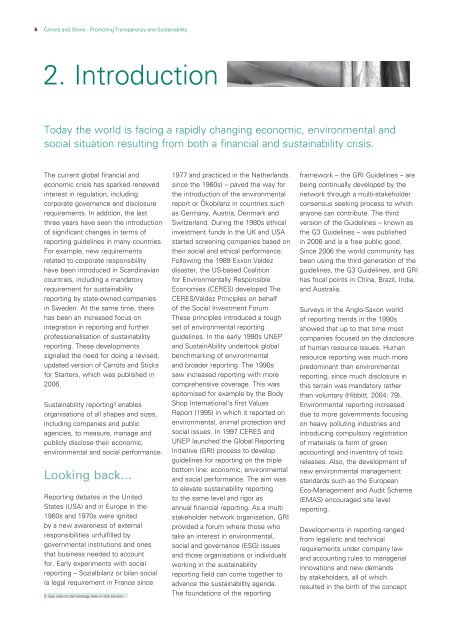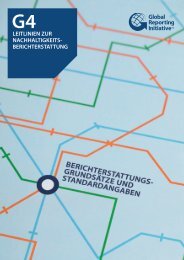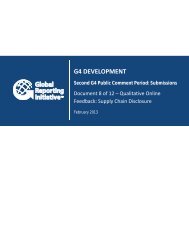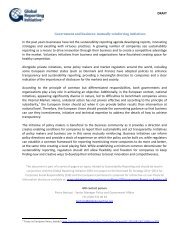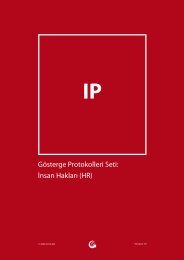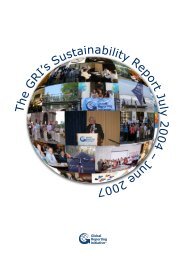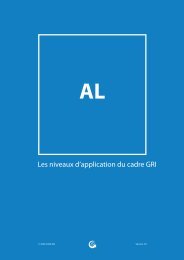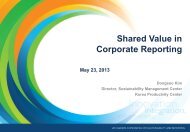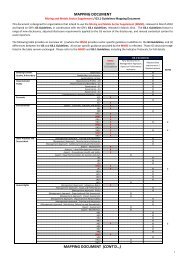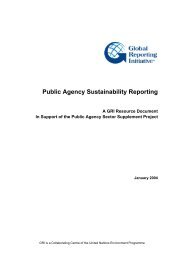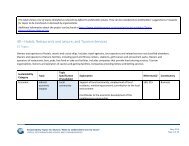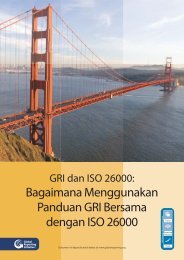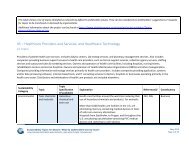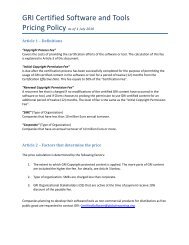CARROTS AND STICKS – PROMOTING ... - Global Reporting Initiative
CARROTS AND STICKS – PROMOTING ... - Global Reporting Initiative
CARROTS AND STICKS – PROMOTING ... - Global Reporting Initiative
You also want an ePaper? Increase the reach of your titles
YUMPU automatically turns print PDFs into web optimized ePapers that Google loves.
6<br />
Carrots and Sticks - Promoting Transparency and Sustainability<br />
2. Introduction<br />
Today the world is facing a rapidly changing economic, environmental and<br />
social situation resulting from both a financial and sustainability crisis.<br />
The current global financial and<br />
economic crisis has sparked renewed<br />
interest in regulation, including<br />
corporate governance and disclosure<br />
requirements. In addition, the last<br />
three years have seen the introduction<br />
of significant changes in terms of<br />
reporting guidelines in many countries.<br />
For example, new requirements<br />
related to corporate responsibility<br />
have been introduced in Scandinavian<br />
countries, including a mandatory<br />
requirement for sustainability<br />
reporting by state-owned companies<br />
in Sweden. At the same time, there<br />
has been an increased focus on<br />
integration in reporting and further<br />
professionalisation of sustainability<br />
reporting. These developments<br />
signaled the need for doing a revised,<br />
updated version of Carrots and Sticks<br />
for Starters, which was published in<br />
2006.<br />
Sustainability reporting 3 enables<br />
organisations of all shapes and sizes,<br />
including companies and public<br />
agencies, to measure, manage and<br />
publicly disclose their economic,<br />
environmental and social performance.<br />
Looking back…<br />
<strong>Reporting</strong> debates in the United<br />
States (USA) and in Europe in the<br />
1960s and 1970s were ignited<br />
by a new awareness of external<br />
responsibilities unfulfilled by<br />
governmental institutions and ones<br />
that business needed to account<br />
for. Early experiments with social<br />
reporting <strong>–</strong> Sozialbilanz or bilan social<br />
(a legal requirement in France since<br />
3 See note on terminology later in this section.<br />
1977 and practiced in the Netherlands<br />
since the 1960s) <strong>–</strong> paved the way for<br />
the introduction of the environmental<br />
report or Ökobilanz in countries such<br />
as Germany, Austria, Denmark and<br />
Switzerland. During the 1980s ethical<br />
investment funds in the UK and USA<br />
started screening companies based on<br />
their social and ethical performance.<br />
Following the 1989 Exxon Valdez<br />
disaster, the US-based Coalition<br />
for Environmentally Responsible<br />
Economies (CERES) developed The<br />
CERES/Valdez Principles on behalf<br />
of the Social Investment Forum.<br />
These principles introduced a tough<br />
set of environmental reporting<br />
guidelines. In the early 1990s UNEP<br />
and SustainAbility undertook global<br />
benchmarking of environmental<br />
and broader reporting. The 1990s<br />
saw increased reporting with more<br />
comprehensive coverage. This was<br />
epitomised for example by the Body<br />
Shop International’s first Values<br />
Report (1995) in which it reported on<br />
environmental, animal protection and<br />
social issues. In 1997 CERES and<br />
UNEP launched the <strong>Global</strong> <strong>Reporting</strong><br />
<strong>Initiative</strong> (GRI) process to develop<br />
guidelines for reporting on the triple<br />
bottom line: economic, environmental<br />
and social performance. The aim was<br />
to elevate sustainability reporting<br />
to the same level and rigor as<br />
annual financial reporting. As a multi<br />
stakeholder network organisation, GRI<br />
provided a forum where those who<br />
take an interest in environmental,<br />
social and governance (ESG) issues<br />
and those organisations or individuals<br />
working in the sustainability<br />
reporting field can come together to<br />
advance the sustainability agenda.<br />
The foundations of the reporting<br />
framework <strong>–</strong> the GRI Guidelines <strong>–</strong> are<br />
being continually developed by the<br />
network through a multi-stakeholder<br />
consensus seeking process to which<br />
anyone can contribute. The third<br />
version of the Guidelines <strong>–</strong> known as<br />
the G3 Guidelines <strong>–</strong> was published<br />
in 2006 and is a free public good.<br />
Since 2006 the world community has<br />
been using the third generation of the<br />
guidelines, the G3 Guidelines, and GRI<br />
has focal points in China, Brazil, India,<br />
and Australia.<br />
Surveys in the Anglo-Saxon world<br />
of reporting trends in the 1990s<br />
showed that up to that time most<br />
companies focused on the disclosure<br />
of human resource issues. Human<br />
resource reporting was much more<br />
predominant than environmental<br />
reporting, since much disclosure in<br />
this terrain was mandatory rather<br />
than voluntary (Hibbitt, 2004: 79).<br />
Environmental reporting increased<br />
due to more governments focusing<br />
on heavy polluting industries and<br />
introducing compulsory registration<br />
of materials (a form of green<br />
accounting) and inventory of toxic<br />
releases. Also, the development of<br />
new environmental management<br />
standards such as the European<br />
Eco-Management and Audit Scheme<br />
(EMAS) encouraged site level<br />
reporting.<br />
Developments in reporting ranged<br />
from legalistic and technical<br />
requirements under company law<br />
and accounting rules to managerial<br />
innovations and new demands<br />
by stakeholders, all of which<br />
resulted in the birth of the concept


